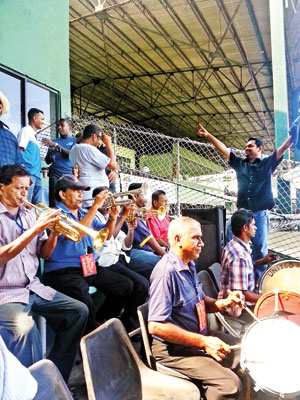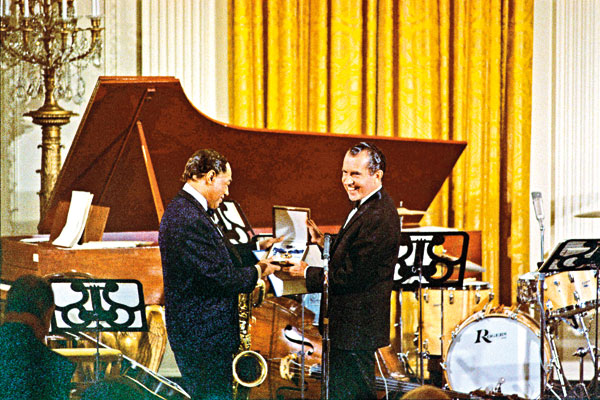Sunday Times 2
A peace of jazz
View(s):By Shehan Ratnavale
Jazz is not immediately synonymous with peace but that is the objective behind International Jazz Day which falls on Tuesday, April 30. Now increasingly celebrated worldwide, this UNESCO-established commemorative day is described by Wikipedia as promoting ‘peace and intercultural dialogue,’ and to ‘highlight jazz and its diplomatic role in bringing together people from all corners of the globe.’
The peace objective fits with UNESCO’s ultimate goal. For example, UNESCO’s world heritage sites seek to foster peace by recognising outstanding national heritage as world heritage thereby creating an environment for worldwide appreciation and cooperation in upkeep. But how does a specific musical genre like jazz fit into diplomatic peace-building? Should Sri Lanka also celebrate?

Sri Lankan Papare Band
Music in general has been thought of before as an agent of peace. The recently released Bob Marley movie highlights Marley’s attempt to use a reggae concert to bring peace to Jamaica, torn with violence from gangsters supporting Prime Minister Michael Manley and Opposition Leader Edward Seaga. But the most poignant story I have heard in connection is from Dr. Sam Doe, a Liberian who worked with me in the UN office in Colombo.
In July 1990, there was a temporary ceasefire in the civil war between the forces of Liberian President Samuel Doe (no relation) and rebels led by Charles Taylor. Sam had been living in cramped conditions on account of a curfew and heavy fighting. The ceasefire gave him an opportunity to stretch his legs. As he walked around a slum area, he came across a young boy whom he described as ‘skin and bone’ lying on the ground. Sam rushed to find some food and was able to buy some popcorn. He rushed back and put a few pieces into the boy’s mouth and encouraged him to chew, but his mouth remained frozen. For a while the boy stared at him. Then he shook his head, closed his eyes and died.
Sam was so shaken by this incident that he pledged to ‘work for peace so that children could live.’ Before joining the UN he set up WANEP, an NGO that also uses music for peace building. They believe ‘the rhythms of melodies and the beats of drums are not just for entertainment but serve as catalysts for reconciliation, unity and communal healing.’ But well before, jazz had a role in diplomatic peace-building. The backdrop comprises three currents dominating the 1950s and 60s namely: the Cold War, decolonization and the civil rights movement. The 1955 Bandung Conference promoting Afro-Asian solidarity organised by India, Burma, Pakistan, Indonesia and Sri Lanka, involving many newly independent countries, saw these currents converge. The US was not officially represented but Congressman Adam Clayton Powell attended independently.
In Bandung, Powell was repeatedly confronted with the question: how could the US promote democracy and capitalism as beneficial, when treatment of its own black population was so appalling? Given racist attacks and segregationists, the Soviets could let the anti-US stories write themselves but TASS, their official news agency actively promoted them. The nuclear stalemate meant the Cold War was a struggle for international opinion, so the TASS depictions were a dagger in the flesh of President Eisenhower’s notion that: ‘there is one sure way to avoid global war and that is to win the Cold War.’
With strong roots in Harlem, Powell conceived a new cold war weapon. On return from Bandung, he persuaded Eisenhower and the State Department that jazz with its Afro-American character could reach out to Asia and Africa. The success of the first jazz diplomacy tour of Dizzy Gillespie in 1956 encouraged the State Department to organise more tours for others such as Dave Brubeck, Louis Armstrong and Duke Ellington.

Highest US civilian award: Duke Ellington receives the Presidential Medal of Freedom from President Richard Nixon
The jazz tours bowled over audiences and presented an inter-racial picture of America. The black musicians, while honoured to represent their country and promote jazz, wouldn’t be apologists for racism. When the State Department suggested a pre-tour briefing Gillespie replied: “I’ve had 300 years of briefing… If they ask me any questions, I will answer them as honestly as I can”. Similarly, Armstrong and Ellington delayed participation on civil rights issues. Ellington included Sri Lanka in his 1963 tour which he agreed to after President Kennedy’s decision to introduce a sweeping civil rights bill. US authorities viewed the musician’s dissent and criticism positively. It showed that unlike the Soviets, people in the US were free to criticise their government.
Beyond diplomatic bridge building, jazz has supported peace with political activism. Marvin Gaye’s anti-Vietnam War soul jazz single ‘What’s Going On’ is a classic example. Others include Hugh Masekela’s ‘Bring Him Back Home’ calling for the release of Nelson Mandela, and Abdullah Ibrahim’s ‘Mannenberg.’ The latter, regarded as a signature tune of South African jazz, is named after a ‘coloured’ township and became an anti-apartheid anthem after being played at protest rallies.
With improvisation as a characteristic, jazz opens its conversation to new influences. ‘Bull Door’ an all-women Moroccan contribution to International Jazz Day 2023 (accessible online) that combines regular instruments with indigenous ones, and with evident Afro-Arabic influences is a fascinating example. It demonstrates that jazz is varied and dynamic.
At the time of writing, 112 countries had registered events to celebrate International Jazz Day. Our policy makers should also encourage registration but not just for good optics. Registering could help strengthen the lifeline tourism offers our challenged economy. Competition dictates a need to add value to our product and linking up with the international jazz fraternity should support the organisation of a regular Colombo Jazz Festival. Indonesia’s Java Jazz Festival attracts thousands of tourists. Colombo can also apply to be a global host city for future Jazz Day celebrations.
Synergies with our own music, papare, performed at cricket matches comes to mind. While the rhythms in papare are Asiatic and different to jazz, the trombones, drums, trumpets and even saxophones used are typical jazz instruments. Papare is also improvisation-based with its musicians saying they can ‘paparefy’ anything. Interestingly, in addition to a range of baila songs, papare musicians play well known jazz standards like ‘When the saints go marching in’, ‘Battle hymn of the Republic’ and even ‘Never on a Sunday’. Taking a cue from music like the Moroccan ‘Bull Door’, we might even have papare jazz in the future.
The worldwide reaction to Jazz Day shows this genre reaches out to people. My thoughts go to the Montreal Jazz Festival I attended in 2002. The festival had a sideshow ‘La Petite Ecole du Jazz’ (the Little School of Jazz) aimed at children. Its acts included inviting children to a microphone to sing lines of nursery rhymes. Musicians would then break into a jazz version of what was sung. When I now compare the pathetic plight of that unfortunate Liberian boy described earlier, and the lives of those Montreal children, I am reminded that a host of systemic issues contribute to conflict.
Jazz is not a quick fix. But when there is a need to reach out, it’s good to make do and patch up with what is appreciated. As George Gershwin said:
“Life is a lot like jazz……..it’s best when you improvise.”
(The writer was a former High Commissioner to Singapore and South Africa and served in between as a focal point for UNESCO in the UN system in Sri Lanka.)

